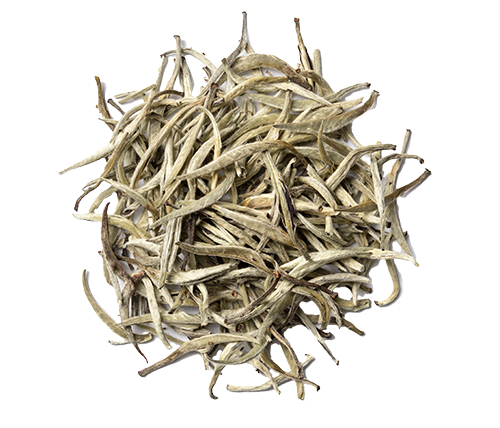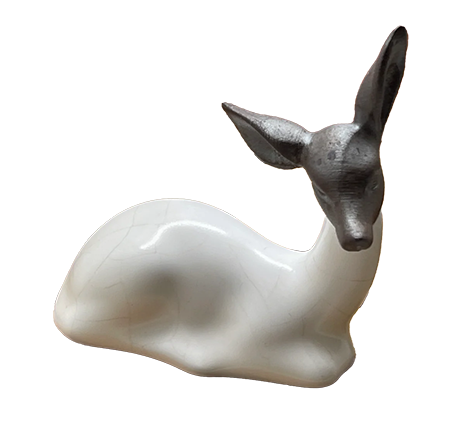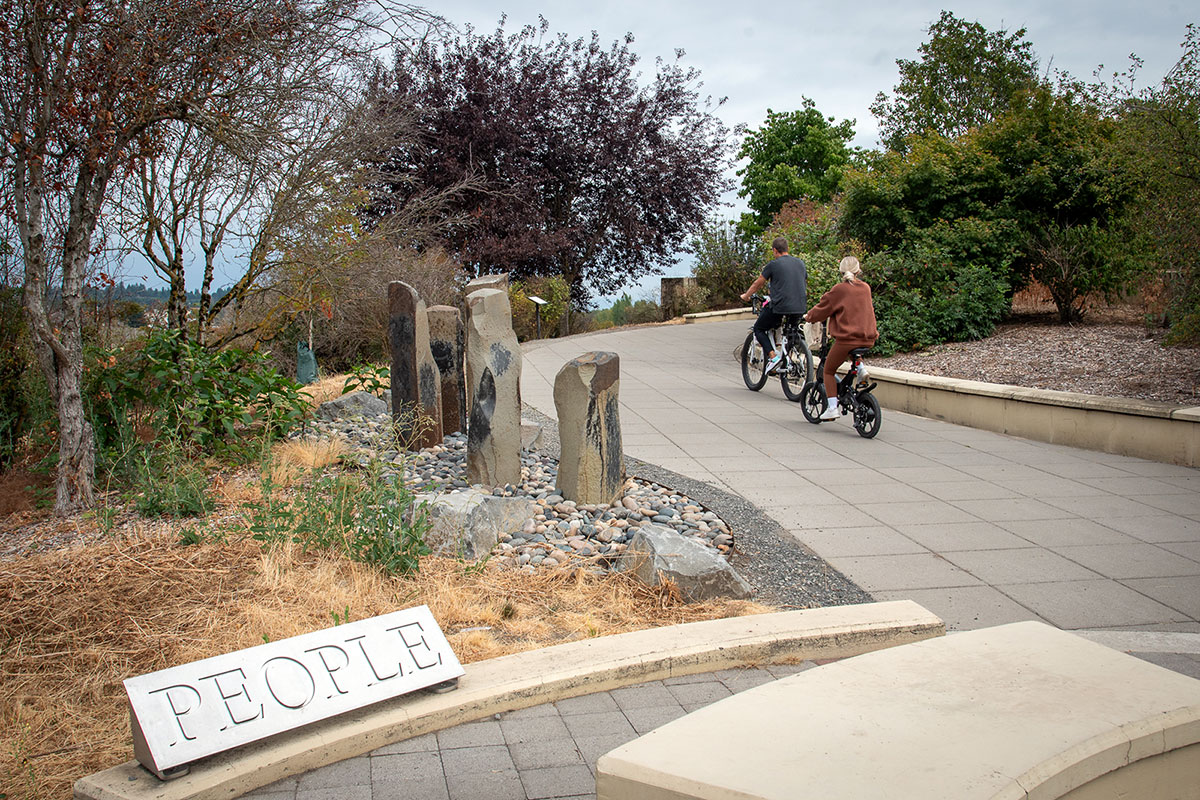
A Confluence of Peregrinations and Prayers
At Cape Disappointment near the mouth of the Columbia River, Maya Lin’s walkway and boardwalk present juxtaposing journeys of discovery.
THE ART
OF TEA AND
CONVERSATION
At Tea Zen Teahouse in southeast Portland, Fengxia Liu provides a traditional Chinese tea ceremony steeped in history, culture, and connection.
BY LAURA J. COLE | June 19, 2024
Fengxia Liu, who runs Tea Zen Teahouse, believes we could all benefit from spending more time drinking tea together.
Growing up in Zhanjiang, China, Liu says drinking tea is simply a normal part of life. She now cherishes those simple moments over, say, white tea (which has les caffeine than black and green teas) spent with her dad, who would draw her into conversation.
“Drinking tea together is a good way to connect,” says Liu, who is both a tea master and landscape architect. “Drinking tea is good for the health of your body, but at the same time, your mind and body are relaxing. Slowly, slowly, you start to talk about the things on your mind and feel happy again.”
To share her love of tea and conversation, in the spring of 2022, Liu opened Tea Zen Teahouse, where she hosts traditional Chinese tea ceremonies—known as gong fu cha—in the teahouse she designed and her husband, Joseph, built by hand in the backyard of their home in southeast Portland. The hourlong sessions start at $38, and include organic black, dark, green, oolong, white, or yellow tea (depending on the season) that Liu selects and brings back from China every year.
During a visit in May, Liu served baihao yinzhen, or silver needle. Produced in Fujian Province, the white tea leaves are brewed using a gaiwan, which is a lidded bowl that hides a special symbolism.
“The cover means the sky. The plate means the land. And the cup represents you,” she says. “So when you use the gaiwan, you hold the whole world in your hands.”
But Tea Zen has been about more than sharing tea and knowledge. It’s been about making connections in the city Liu moved to on a part-time basis nearly 20 years ago. For years, she would spend half of the year in the City of Roses and the other half back home in China, an “easy” 12-hour flight, she says. Liu still runs her landscape architecture business in Shenzhen, which is roughly 30 miles north of Hong Kong and known as the Silicon Valley of China. When the pandemic happened and Liu couldn’t return to Shenzhen for a couple of years, she wanted a way to bring what she loves about China to Oregon.

Yinzhen, or silver needle, is one of three classic white teas from China. It is considered the highest graded white tea, with baihao being the highest among the silver needles.
Photograph by Romario Ien / Adobe Stock
Fengxia Liu, who runs Tea Zen Teahouse, believes we could all benefit from spending more time drinking tea together.
Growing up in Zhanjiang, China, Liu says drinking tea is simply a normal part of life. She now cherishes those simple moments over, say, white tea (which has les caffeine than black and green teas) spent with her dad, who would draw her into conversation.
“Drinking tea together is a good way to connect,” says Liu, who is both a tea master and landscape architect. “Drinking tea is good for the health of your body, but at the same time, your mind and body are relaxing. Slowly, slowly, you start to talk about the things on your mind and feel happy again.”
To share her love of tea and conversation, in the spring of 2022, Liu opened Tea Zen Teahouse, where she hosts traditional Chinese tea ceremonies—known as gong fu cha—in the teahouse she designed and her husband, Joseph, built by hand in the backyard of their home in southeast Portland. The hourlong sessions start at $38, and include organic black, dark, green, oolong, white, or yellow tea (depending on the season) that Liu selects and brings back from China every year.

Yinzhen, or silver needle, is one of three classic white teas from China. It is considered the highest graded white tea, with baihao being the highest among the silver needles.
Photograph by Romario Ien / Adobe Stock
During a visit in May, Liu served baihao yinzhen, or silver needle. Produced in Fujian Province, the white tea leaves are brewed using a gaiwan, which is a lidded bowl that hides a special symbolism.
“The cover means the sky. The plate means the land. And the cup represents you,” she says. “So when you use the gaiwan, you hold the whole world in your hands.”
But Tea Zen has been about more than sharing tea and knowledge. It’s been about making connections in the city Liu moved to on a part-time basis nearly 20 years ago. For years, she would spend half of the year in the City of Roses and the other half back home in China, an “easy” 12-hour flight, she says. Liu still runs her landscape architecture business in Shenzhen, which is roughly 30 miles north of Hong Kong and known as the Silicon Valley of China. When the pandemic happened and Liu couldn’t return to Shenzhen for a couple of years, she wanted a way to bring what she loves about China to Oregon.
“I needed to connect with humans,” says Liu. “That’s why I started offering the experience on AirBNB. I’ve met people from all over the world. Sometimes the experience is for me because some groups are made up of six people from three countries. They share different languages to talk about the tea, which is really awesome for me.”
As two examples, Liu mentions chai and TET (or true English tea).
The origins of tea date back to at least 1600 B.C., when the earliest archeological evidence of the beverage was cultivated in China. According to legend, Shennong, China’s second mythical emperor, discovered tea when a leaf fell into the boiled water he was drinking. The culture of tea spread throughout the Tang dynasty, gaining even wider appeal after the monk Lu Yu—known as the “Sage of Tea”—wrote The Classic of Tea (Cha Jing) in the 8th century. The scroll is the oldest known guide to tea drinking and culture, and covers everything from growing and harvesting to crafting and brewing.
Yu is credited with inventing the current word for tea when he mistakenly omitted a cross stroke from the character tu (荼), resulting in cha (茶). In many languages, including Mandarin and Cantonese, cha took hold, with nations across the Tea Horse Road adopting a version of it, becoming chai in Hindi and chay in Persian. Tu was not lost, however. In 1607, the Dutch were introduced to tea near modern-day Fujian province, picking up on the Hokkien pronounciation that sounds more like thee, which became the root word te and spread across the oceans to Europe. This led to the popular conception that the drink is called chai or tea, depending on whether it was introduced to a culture by land or sea.
And whichever name you call it by, Liu is sure to serve up a wonderful cup—and conversation. As one reviewer commented on AirBNB in July 2022, shortly after Liu began Tea Zen, “What a special opportunity to press pause, sit together, share tea, and connect. This is what our communities and neighborhoods need—the chance to really see and celebrate each other!”

Tea pets are more than just cute decorations. Each one has special meaning. For example, water buffalo are a reminder to relax and deer symbolize a long and healthy life.
The pets also provide a polite way to signal to your host that you would like some fresh tea. Say your tea has gotten cold or has too many leaves in it. Simply pour your tea over one of the animals, and your tea master will get the hint.
Photograph by Laura J. Cole
“I needed to connect with humans,” says Liu. “That’s why I started offering the experience on AirBNB. I’ve met people from all over the world. Sometimes the experience is for me because some groups are made up of six people from three countries. They share different languages to talk about the tea, which is really awesome for me.”
As two examples, Liu mentions chai and TET (or true English tea).

Tea pets are more than just cute decorations. Each one has special meaning. For example, water buffalo are a reminder to relax and deer symbolize a long and healthy life.
The pets also provide a polite way to signal to your host that you would like some fresh tea. Say your tea has gotten cold or has too many leaves in it. Simply pour your tea over one of the animals, and your tea master will get the hint.
Photograph by Laura J. Cole
The origins of tea date back to at least 1600 B.C., when the earliest archeological evidence of the beverage was cultivated in China. According to legend, Shennong, China’s second mythical emperor, discovered tea when a leaf fell into the boiled water he was drinking. The culture of tea spread throughout the Tang dynasty, gaining even wider appeal after the monk Lu Yu—known as the “Sage of Tea”—wrote The Classic of Tea (Cha Jing) in the 8th century. The scroll is the oldest known guide to tea drinking and culture, and covers everything from growing and harvesting to crafting and brewing.
Yu is credited with inventing the current word for tea when he mistakenly omitted a cross stroke from the character tu (荼), resulting in cha (茶). In many languages, including Mandarin and Cantonese, cha took hold, with nations across the Tea Horse Road adopting a version of it, becoming chai in Hindi and chay in Persian. Tu was not lost, however. In 1607, the Dutch were introduced to tea near modern-day Fujian province, picking up on the Hokkien pronounciation that sounds more like thee, which became the root word te and spread across the oceans to Europe. This led to the popular conception that the drink is called chai or tea, depending on whether it was introduced to a culture by land or sea.
And whichever name you call it by, Liu is sure to serve up a wonderful cup—and conversation. As one reviewer commented on AirBNB in July 2022, shortly after Liu began Tea Zen, “What a special opportunity to press pause, sit together, share tea, and connect. This is what our communities and neighborhoods need—the chance to really see and celebrate each other!”


At Cape Disappointment near the mouth of the Columbia River, Maya Lin’s walkway and boardwalk present juxtaposing journeys of discovery.

Located near the confluence of the Willamette and Columbia rivers, the Vancouver Land Bridge merges rivers, land, people, and trade.

